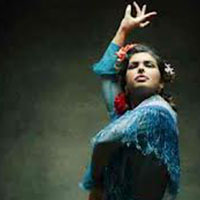(Research and Creation Laboratory )
L'animal a l'esquena (Celrà)
From 26/03/2014 to 29/03/2014
Pastora Galván
( Pastora Galván, Pedro G. Romero, María Muñoz )
 Pastora Galván, in her research into the experience and feelings of flamenco, seeks to pay homage to the previous generation of dancers, who played a key role in its history: Eugenia de los Reyes, Carmen Ledesma, Rocío de Loreto, Manuela Carrasco, Ana Mari Bueno and Loli Sevilla, among others. This was not a tragic generation. The period after the Second World War was a time of modernisation. They worked in Flamenco venues, tourist spots and ballets, at parties and US bases, on international tours. Myths abound: the Sevillian School, the differences between Seville and Triana, the gypsy style. The interest of this research lies not just in biographies, but in understanding a way of dancing that has names yet belongs to no one.
Pastora Galván, in her research into the experience and feelings of flamenco, seeks to pay homage to the previous generation of dancers, who played a key role in its history: Eugenia de los Reyes, Carmen Ledesma, Rocío de Loreto, Manuela Carrasco, Ana Mari Bueno and Loli Sevilla, among others. This was not a tragic generation. The period after the Second World War was a time of modernisation. They worked in Flamenco venues, tourist spots and ballets, at parties and US bases, on international tours. Myths abound: the Sevillian School, the differences between Seville and Triana, the gypsy style. The interest of this research lies not just in biographies, but in understanding a way of dancing that has names yet belongs to no one.
Flamenco is full of paradox, constantly testing the space it occupies, however much it may continue to return, over and over again, to tradition, or even to its ancestral, mythological, atavistic origins. Flamenco always sits uncomfortably with the place allotted to it and, even when this fits, has an imperious need to mark itself out as different.
The idea is to operate in a triangle: on one side Pastora Galván, the flamenco artists accompanying her, the shades of the Galván family; on another María Muñoz, Pep Ramis and the creative team of Mal Pelo; thirdly Pedro G. Romero, the documentation of Carmen Pulpón, her dissertation Being a Dancer: Art, Gender/Genre and Work, and the experiences of a generation of dancers.
During the laboratories, which will take place at L'animal a l'esquena over several months, the band of musicians, el Niño de Elche, Mal Pelo and Pedro G. Romero will meet to define the tools to enable them to work together and establish the conversation from which joint creation can flow.
La diferencia/The Difference will be premiered on the 3rd October at the Teatro de la Maestranza in Seville, as part of the Bienal de Flamenco de Sevilla.
L'animal a l'esquena (Celrà)
From 26/03/2014 to 29/03/2014
Pastora Galván
( Pastora Galván, Pedro G. Romero, María Muñoz )
 Pastora Galván, in her research into the experience and feelings of flamenco, seeks to pay homage to the previous generation of dancers, who played a key role in its history: Eugenia de los Reyes, Carmen Ledesma, Rocío de Loreto, Manuela Carrasco, Ana Mari Bueno and Loli Sevilla, among others. This was not a tragic generation. The period after the Second World War was a time of modernisation. They worked in Flamenco venues, tourist spots and ballets, at parties and US bases, on international tours. Myths abound: the Sevillian School, the differences between Seville and Triana, the gypsy style. The interest of this research lies not just in biographies, but in understanding a way of dancing that has names yet belongs to no one.
Pastora Galván, in her research into the experience and feelings of flamenco, seeks to pay homage to the previous generation of dancers, who played a key role in its history: Eugenia de los Reyes, Carmen Ledesma, Rocío de Loreto, Manuela Carrasco, Ana Mari Bueno and Loli Sevilla, among others. This was not a tragic generation. The period after the Second World War was a time of modernisation. They worked in Flamenco venues, tourist spots and ballets, at parties and US bases, on international tours. Myths abound: the Sevillian School, the differences between Seville and Triana, the gypsy style. The interest of this research lies not just in biographies, but in understanding a way of dancing that has names yet belongs to no one.Flamenco is full of paradox, constantly testing the space it occupies, however much it may continue to return, over and over again, to tradition, or even to its ancestral, mythological, atavistic origins. Flamenco always sits uncomfortably with the place allotted to it and, even when this fits, has an imperious need to mark itself out as different.
The idea is to operate in a triangle: on one side Pastora Galván, the flamenco artists accompanying her, the shades of the Galván family; on another María Muñoz, Pep Ramis and the creative team of Mal Pelo; thirdly Pedro G. Romero, the documentation of Carmen Pulpón, her dissertation Being a Dancer: Art, Gender/Genre and Work, and the experiences of a generation of dancers.
During the laboratories, which will take place at L'animal a l'esquena over several months, the band of musicians, el Niño de Elche, Mal Pelo and Pedro G. Romero will meet to define the tools to enable them to work together and establish the conversation from which joint creation can flow.
La diferencia/The Difference will be premiered on the 3rd October at the Teatro de la Maestranza in Seville, as part of the Bienal de Flamenco de Sevilla.